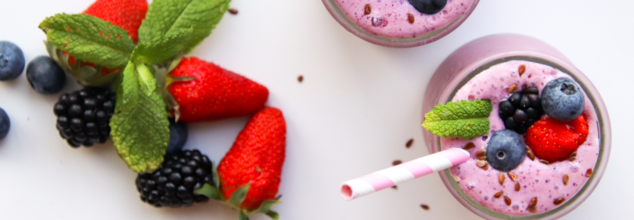- Health Conditions A-Z
- Health & Wellness
- Nutrition
- Fitness
- Health News
- Ayurveda
- Videos
- Medicine A-Z
- Parenting
This Unexpected Smoothie Is A Must For Boosting Your Longevity

Berry Smoothies for Health (Credit-Canva)
As we age, free radicals contribute to oxidative stress which then impacts our bodies and immune systems. In an interview with Health Digest registered dietitian Jana Greene Hand explains that antioxidants, abundant in berries, neutralize these free radicals, effectively slowing down the aging process. Berries are packed with nutrients like vitamin C, flavonoids, and anthocyanins, which help mitigate the risks of cardiovascular issues, Alzheimer's disease, certain cancers, and other age-related conditions. Notably, blueberries contain antioxidants that can delay brain aging, protect brain cell function, and improve communication between brain cells.
Why Choose Berry Smoothies?
While there are various ways to enjoy berries, such as eating them fresh, frozen, or in jams, smoothies offer a convenient and delicious option for incorporating them into your daily routine. Smoothies allow you to combine multiple types of berries, maximizing the variety of nutrients and antioxidants you consume. They are also easily customizable, allowing you to add other healthy ingredients like protein, fiber, and healthy fats. This makes berry smoothies a complete and balanced meal or snack that supports overall health and well-being. Furthermore, the blending process breaks down the berries, making their nutrients more readily available for absorption by the body.
Beyond Brain Health: Comprehensive Benefits
While blueberries are particularly beneficial for brain health due to their high concentration of anthocyanins, which have been linked to improved memory and cognitive function, berries in general offer a wide range of advantages beyond just brain health, including reducing cardiovascular risks. Greene highlights that berries can lower LDL cholesterol, often referred to as "bad" cholesterol, and high blood pressure, both of which are major risk factors for heart disease. The polyphenols found in berries also help improve inflammation and joint function, potentially slowing down arthritis and other age-related joint problems. This makes berries a valuable food for maintaining mobility and reducing pain as you age. Even if longevity isn't your primary goal, regular berry consumption will positively impact your overall health as you age.
Sweetness without the Sugar Rush
Berries are naturally sweet yet low in sugar compared to many other fruits, making them a suitable choice for individuals with diabetes or those watching their sugar intake. This allows you to enjoy the delicious taste of sweetness without the negative effects of a rapid spike in blood sugar levels. The low glycemic index of berries means they release sugar slowly into the bloodstream, providing a steady source of energy without causing crashes. This also makes them a great option for weight management as they can help control cravings and keep you feeling full for longer. Their delicious taste combined with their impressive health benefits makes berry smoothies a valuable and guilt-free addition to any diet.
Essential Ingredients for Optimal Nutrition
Greene recommends including a protein source, such as low-fat or non-fat Greek yogurt or protein powder, to create a more balanced and satisfying smoothie. Protein helps to build and repair tissues, supports muscle health, and promotes satiety, keeping you feeling full for longer. Her favorite is a triple berry protein smoothie, containing a cup of mixed blueberries, strawberries, and raspberries, maximizing the variety of antioxidants and flavors. Fiber is another crucial component, especially as we age, as it supports digestive health, helps regulate blood sugar levels, and can contribute to feelings of fullness.
This Popular Christmas Food Could Raise Your Risk of Cancer And Heart Attack

Credits: Canva
Millions of people are stocking up on food for Christmas, planning the main meal and everything that comes with the festive stretch. What many do not realise is that there is a proven link between cancer and one much-loved item that often sits on the Christmas Day plate.
While sugar is often blamed for causing cancer, that belief is not supported by evidence. In fact, only two foods have a confirmed, direct link to cancer: alcohol and processed meat. And popular pigs in blankets clearly fall into the processed meat category.
Popular Christmas Food Could Raise Your Risk of Cancer And Heart Attack
To be clear, no one is saying that eating pigs in blankets on Christmas Day will give you cancer, just as no one suggests that a single glass of wine or sherry will lead to a diagnosis. That said, recent scientific evidence shows there is no truly safe level of alcohol consumption. In a recent report, Vivek Murthy, former surgeon general of the US Public Health Service, warned that alcohol use has been directly linked to at least seven different types of cancer, and that even light or moderate drinking can raise a person’s cancer risk.
As per Mirror, both processed meat and alcohol are classified as Group 1 carcinogens by the World Health Organisation, which means there is clear evidence they can cause cancer in humans. According to the WHO, “There is convincing evidence that the agent causes cancer.” Tobacco smoking and asbestos are also listed as Group 1 carcinogens, although the organisation clarifies that this does not mean alcohol and processed meat are as dangerous as smoking or asbestos.
Cancer Research UK also states clearly, “We know for certain that processed meat causes cancer. We are as confident about this link as we are about other established causes of cancer, such as tobacco and alcohol.”
What Is Processed Meat?
The World Health Organisation defines processed meat as “meat that has been transformed through salting, curing, fermentation, smoking, or other processes to enhance flavour or improve preservation.” Sausages and bacon are commonly cited examples by both the WHO and Cancer Research UK.Cancer Research UK explains that processed meats contain chemicals that are either added during processing or formed during cooking. These include nitrates and nitrites, which help keep processed meat fresh for longer. The organisation notes, “When we consume them, nitrates and nitrites can turn into N-nitroso chemicals (NOCs), which can damage the cells lining the bowel. This damage can increase the risk of bowel cancer.”
Why Does Alcohol Cause Cancer?
Alcohol increases cancer risk through biological processes that occur as it is broken down in the body. This means that any alcoholic drink, regardless of how expensive, high-quality, or mild it may seem, carries a cancer risk. There is no safe threshold for drinking alcohol. The WHO says cancer risk “rises significantly the more alcohol is consumed,” but also points out that “the latest available data show that around half of all alcohol-related cancers are caused by ‘light’ and ‘moderate’ drinking,” defined as less than 1.5 litres of wine, less than 3.5 litres of beer, or under 450 millilitres of spirits per week.
Processed Meat And Heart Disease
In 2021, researchers at Oxford University reported that the “largest review of all large-scale studies to date shows red and processed meat increase the risk of heart disease.”
Worldwide, coronary heart disease causes nearly nine million deaths each year, making it the leading cause of death globally. Scientists from the University of Oxford’s Nuffield Department of Population Health said their analysis “showed that each additional 50g per day of processed meat, such as bacon, ham, or sausages, was linked to an 18% higher risk of coronary heart disease.”
What Is The Best Time To Eat Dinner?

Credits: Canva
Eating is something we do every day, and its connection to our weight is undeniable. Most of us concentrate on what we eat, and rightly so, because the nutritional value and calorie content of food directly impact our weight. Yet, an increasingly important factor in weight management is when we eat. Nutritionist Pooja Makhija explains the science behind having early dinners, particularly in the evening, and how this aligns with the body clock to support overall weight management.
In an Instagram video, she writes in the caption, “You don't start digesting worse at night because of the food… you digest worse because melatonin has already risen,” adding, “Melatonin climbs 2–3 hours before your bedtime, dropping your insulin sensitivity by up to 50% and switching fat cells into storage mode. So the same meal hits very differently at 7 pm vs 10 pm.”
What Is Melatonin?
Melatonin is a hormone made by the pineal gland in the brain that helps control the body’s sleep-wake cycle. Its levels usually rise in the evening, peak during the night, and fall in the early morning. Many doctors even recommend melatonin supplements to help regulate sleep patterns, though they can sometimes cause side effects, so consulting a physician is advised, as per Healthline.
How Does Melatonin Affect Your Fat Storage In Body?
In her video, Pooja grabs attention by asking, “We all know that melatonin makes you sleepy. But what if I told you that melatonin wakes up your fat cells and makes them store more? Hadn't heard of that?”
She continues, “Melatonin isn’t just your sleep hormone. It’s your body’s night mode switch. As it rises in the evening, your metabolism slows down. Insulin sensitivity drops 25 to 50 percent, glucose clearance slows, and your fat cells switch from burning energy to storing it.” Referring to a study published in the *Clinical Endocrinology and Metabolism* journal, she adds, “People who ate dinner when their melatonin was high had a 34 percent higher glucose spike. Same people, same meal, same calories—just bad timing.”
What Is Front Loading Calories?
Front-loading calories is a way of eating where most of your daily calories are consumed earlier in the day, with a big breakfast and hearty lunch and a lighter dinner in the evening. This approach matches your meals with your body’s natural circadian rhythms, improving metabolism, insulin response, and appetite control. It helps with weight management and energy levels by taking advantage of the morning metabolism, reducing late-night cravings, and supporting better sleep.
What Is The Correct Time To Have Dinner To Prevent Fat Storage And Weight Gain?
Pooja Makhija says the most effective method to prevent melatonin from triggering fat storage is to eat early dinners and front-load calories during the day.
“So when most of your calories land late at night, it’s at a time when your biology is saying, ‘I’m done for the day; I’m not burning more.’ In contrast, front-loading calories with a big breakfast, solid lunch, and small dinner means you’re eating when melatonin is low. Your insulin is sharp, mitochondria are active, and your body is in daytime burning mode,” she explains.
She concludes with a reminder: “Your fat cells have melatonin receptors, and they behave differently depending on the time of day. Front-loading isn’t a hack—it’s circadian biology. Melatonin guides your metabolism. So eat in tune with your body clock, not against it, and notice the difference.”
According to Healthline, the ideal dinner time for better melatonin regulation and metabolism is 2–3 hours before bedtime—before your body naturally begins releasing melatonin—to avoid insulin spikes and fat storage.
Afraid You Will Gain Weight With Christmas Feast? Here's What You Can Do

Credits: iStock
Christmas is meant to be joyful, but the fear of gaining weight often sneaks in between helpings of roast potatoes and dessert. There is a reason this worry feels real. Nearly half of the weight many people gain in a year tends to show up during holiday periods, and once gained, it often sticks around longer than expected. The good news is that enjoying festive food does not have to mean starting the new year with regret. Smart choices, balanced plates, and mindful eating can make all the difference.
Build your plate around plant-forward foods
Festive spreads are often richer than everyday meals, which is why vegetables play a key role in keeping things balanced. Christmas classics like Brussels sprouts, red cabbage, carrots, parsnips, onions, and even potatoes offer more than color and crunch.
Cruciferous vegetables such as Brussels sprouts and red cabbage support the body’s natural detox systems and provide compounds linked to healthy ageing.
Roasted root vegetables supply complex fibers that feed good gut bacteria, helping digestion stay on track despite heavier meals. Onions support natural cleansing processes, while cooked and cooled potatoes contain resistant starch that behaves like fiber and helps keep blood sugar steady. This also makes leftovers a surprisingly good option.
Adding grains and healthy fats further improves satiety. Quinoa provides complex carbohydrates along with complete protein, while avocado contributes heart friendly fats that help you feel full longer. Pomegranate seeds add antioxidants and support gut and heart health, making them a festive ingredient worth sprinkling generously.
Pair plants with protein for better balance
A common reason for holiday overeating is a lack of protein on the plate. Protein helps regulate appetite and keeps energy levels stable. Plant based mains such as mushroom wellingtons, nut roasts, or lentil loaves work well for this reason. Mushrooms offer antioxidants and immune supporting nutrients, while lentils provide protein, iron, and fiber without excess fat. Chestnuts stand out among nuts because they act more like a starch, making them filling but lighter than many other nut based foods.
Even for non vegetarians, these dishes can sit comfortably alongside traditional mains, adding variety and balance without sacrificing flavor.
Mindful eating matters as much as food choices
What and how you eat both matter during the holidays. Slowing down helps the body register fullness before overeating sets in. Taking time to notice the aroma, texture, and taste of food improves satisfaction, often with smaller portions. Putting cutlery down between bites and staying present at the table can naturally reduce mindless eating.
Hydration is another simple but powerful tool. Alcoholic drinks are calorie dense and dehydrating, which can increase appetite. Alternating festive drinks with water or fruit based punches helps manage intake while still allowing you to join the celebration.
Choose desserts that satisfy without excess
Dessert does not need to be skipped to stay on track. Lighter versions can be just as comforting. Fruit based options like baked apples, berry crumbles with oats and nuts, or spiced poached pears offer natural sweetness and fiber. Greek yogurt based desserts provide protein and probiotics that support digestion and help prevent overindulgence.
Dark chocolate with a high cocoa content can also fit in. A small portion enjoyed slowly with fruit delivers antioxidants and satisfies cravings without going overboard. Nuts and dates make rich, festive treats too, but portion awareness matters since they are calorie dense.
Focus on joy, not guilt
Christmas food is about connection, tradition, and pleasure. Guilt free enjoyment actually supports digestion and overall wellbeing. When meals are built around vegetables, balanced with protein, and eaten mindfully, the festive season can feel indulgent without tipping into excess. The goal is not perfection, but balance. Nourish the body, enjoy the moment, and let Christmas be both festive and kind to your health.
© 2024 Bennett, Coleman & Company Limited

